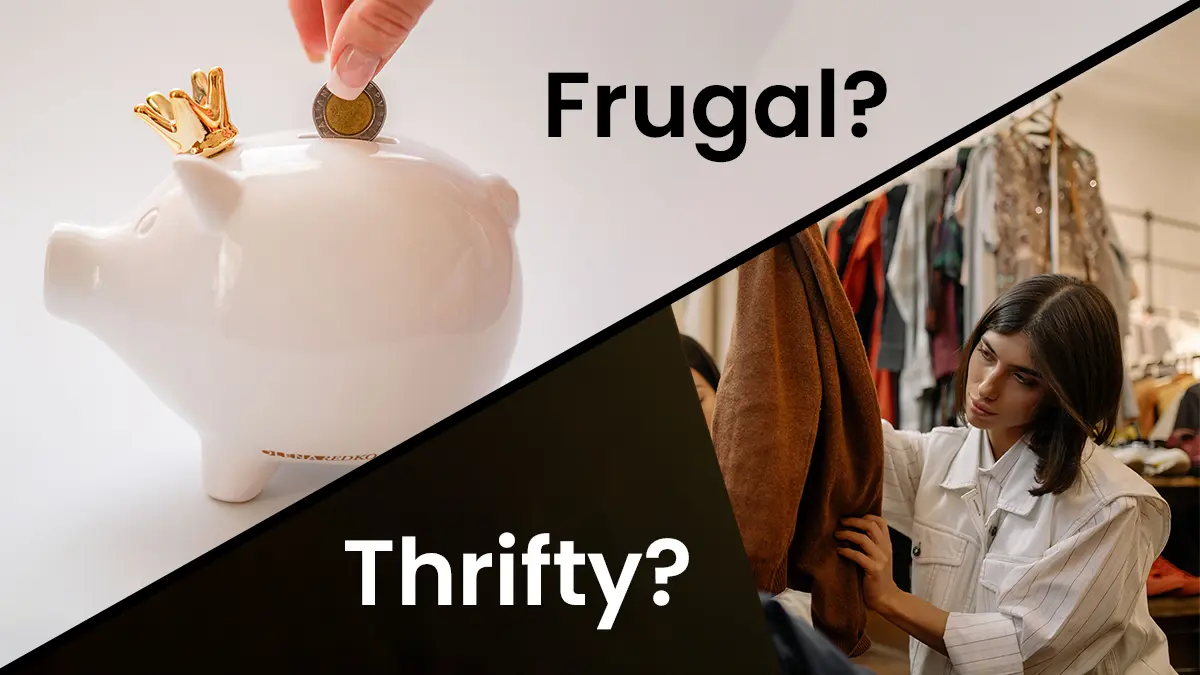Frugal and Thrifty: what do they mean?
Being Frugal and being Thrifty often are used interchangeably, but there are subtle differences.
Both frugality and thriftiness involve being careful with money and making smart financial choices, but frugality may have a stronger emphasis on simplicity and minimizing expenses, while thriftiness focuses on finding ways to maximize the value of money spent.
Let’s define them now:
- Frugal:
- Frugality refers to a lifestyle or approach to spending and saving money where individuals consciously seek to minimize their expenses and avoid unnecessary expenditures.
- Frugal people are careful and mindful about how they spend their money, and they often prioritize saving for the future or important financial goals.
- Frugality can sometimes be associated with a sense of simplicity and minimalism, as frugal individuals may choose to live with less and focus on essentials.
- Thrifty:
- Thriftiness also involves being economical and wise with money, but it often emphasizes the idea of getting value for money and making the most of resources.
- Thrifty individuals are good at finding deals, using coupons, and making the most of discounts and sales.
- Thriftiness may not necessarily imply a minimalist lifestyle; thrifty individuals may still buy things they need or want, but they do so while being resourceful and cost-conscious.
Ultimately, both qualities can lead to better financial stability and the ability to achieve financial goals.
Frugal and Thrifty real-world examples

Let’s bring these two terms to life by looking at some examples of frugality and thriftiness.
Frugal Examples:
- Minimalist Living: A frugal person might choose to live in a smaller, more affordable apartment rather than a larger, more expensive one. They may prioritize having fewer possessions and avoiding unnecessary purchases to save money and reduce clutter.
- Homemade Meals: Frugal individuals often prepare meals at home rather than dining out frequently. They buy groceries in bulk, plan their meals, and avoid expensive restaurant bills.
- Public Transportation: Someone practicing frugality might opt for public transportation or carpooling instead of owning and maintaining a car to save on fuel, insurance, and maintenance costs.
- DIY Repairs: Frugal homeowners may tackle home repairs and maintenance themselves rather than hiring professionals, saving money on labor costs.
- Thrift Store Shopping: While thrifty, this can also be a frugal choice. A frugal person may shop at thrift stores for clothing and household items, focusing on secondhand items that are still in good condition rather than buying new items.
Thrifty Examples:
- Coupon Clipping: A thrifty shopper diligently collects and uses coupons to reduce the cost of groceries and household items at the store.
- Price Comparison: Thrifty consumers frequently compare prices online or in-store to find the best deals and discounts before making a purchase.
- Cashback and Rewards Programs: Thrifty individuals take advantage of cashback offers, rewards programs, and credit card perks to get discounts or earn rewards on their purchases.
- Buying in Bulk: Thrifty shoppers purchase non-perishable goods in bulk when they are on sale to save money in the long run.
- Refurbished Electronics: Rather than buying brand-new electronics, a thrifty person may opt for refurbished or certified pre-owned devices to get a quality product at a lower price.
- DIY Home Improvement: Thrifty homeowners may take on home improvement projects themselves but will also seek out the best deals on materials and tools to maximize savings.
Is being Frugal and Thrifty the same as being Stingy or Cheap?

Unfortunately, frugal and thrifty people are often tarred with the brush of being stingy (cheap).
Being cheap has a negative connotation and implies a reluctance to spend money, often to the detriment of quality or fairness.
Cheap individuals might prioritize the lowest price above all else, even if it means sacrificing quality, ethical considerations, or fair compensation for services.
They may cut corners in a way that can be detrimental or uncomfortable for themselves or others.
So, are frugal and thrifty people cheap? Not at all!
The problem is that there is a fine line between being frugal and being cheap. It can be difficult to know if you are indeed being frugal/thrifty or simply stingy with your money.
Moreover, people might have different perceptions of the same situation; one person might view something as being frugal, whilst another person might say it’s cheap.
It comes down to differences in the way people are raised, their financial education, and attitudes towards money.
Key Differences between Frugal/Thrifty and Cheap
To identify whether you are being frugal or simply cheap, you might want to think about it through this lens:
- Value vs. Cost: Thrifty and frugal individuals seek value for their money, while cheap individuals focus primarily on minimizing costs, often at the expense of value.
- Quality vs. Quantity: Thrifty and frugal individuals may be willing to spend more on high-quality items or experiences that provide long-term value, while cheap individuals may prioritize quantity or short-term cost savings.
- Long-Term vs. Short-Term: Thrifty and frugal approaches often have a long-term perspective, emphasizing savings, investments, and sustainability. Cheapness often focuses on immediate cost savings without considering long-term consequences.
- Lifestyle vs. Extreme Measures: Frugality can involve adopting a simplified, intentional lifestyle to reduce overall expenses. Cheapness often involves extreme measures that can negatively impact quality of life or relationships.
- Social Considerations: Cheapness can sometimes be seen as inconsiderate or stingy, as it may involve not adequately compensating others or refusing to contribute to shared expenses. Thrifty and frugal approaches are more likely to consider ethical and social aspects of spending.
Benefits of being Frugal & Thrifty
There are some obvious and some not-so-obvious benefits of being both frugal and thrifty.
First, you save money.
Money stress affects more than half the population every year. It can destroy your physical and mental health.
Having a financial safety net in the form of an emergency fund in a savings account can alleviate the stress of unexpected financial burdens.
But more than that, being frugal and thrifty in some areas of your life allows you to be lavish and generous in others.
If you are not bothered about brand new or designer clothes, but you are a fan of nice cars, it makes sense to shop at a charity store for your clothing, and at Audi for your new car.
Or if you are the other way around, it makes sense for you to shop at Armani for your clothes and the used car dealership for your vehicle.
Being conscious about your spending (a characteristic of frugal people) allows you to prioritize the things in life that truly matter to you.
Some other benefits include:
- Savings and Wealth Accumulation: Frugal and thrifty individuals save a significant portion of their income, which allows them to build wealth over time. They have the resources to invest, grow their savings, and achieve financial goals.
- Early Retirement: Many frugal individuals are able to retire early (See the FIRE movement) or have the option to do so because they have saved and invested wisely.
- Appreciation of Value: Frugal and thrifty individuals tend to appreciate the value of what they have and make thoughtful, intentional purchases. They ultimately can be happier and more satisfied with their lives.
- Eco friendly: The planet might thank you for being Frugal and Thrifty. These practices often align with sustainable and sustainable living lifestyles, as they involve reducing consumption and waste.
Should I be Frugal and Thrifty?
If you’re concerned about being labelled frugal or thrifty, don’t be!
Being smart with your money is a key characteristic of self-made millionaires. Yes, wealthy people are often high-earners but they defend their wealth through frugality and thriftiness too.






